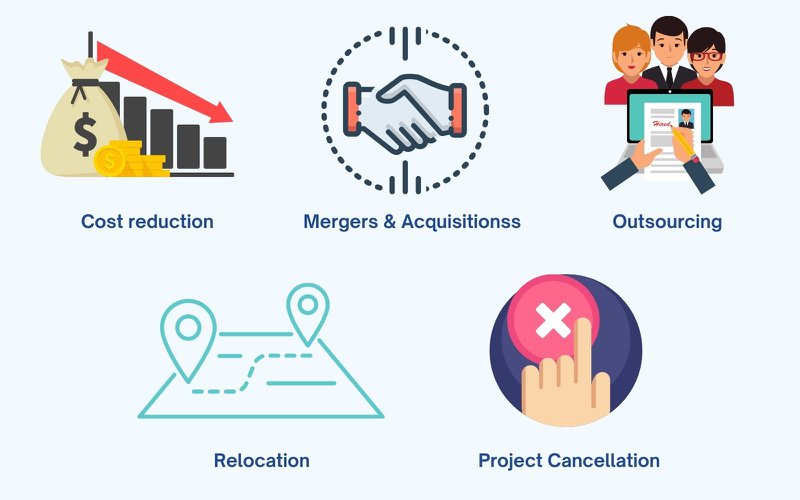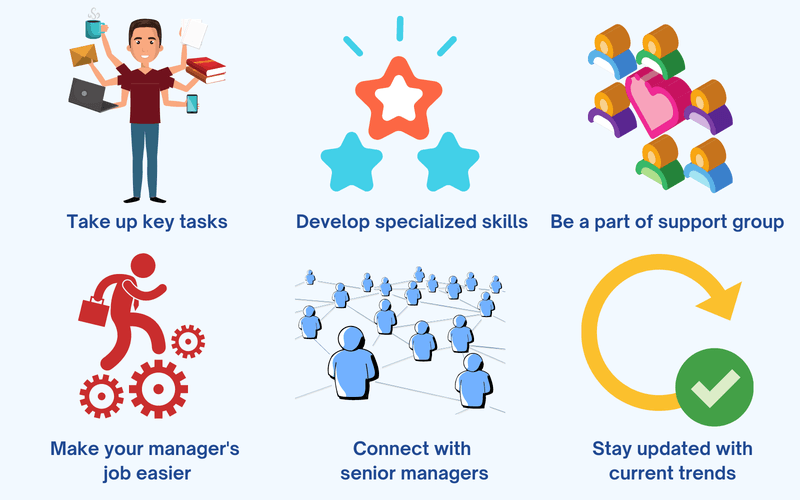The path to success is often imagined to be a straight line until you realize you can be fireable, and there are many more roadblocks on the way:
A career also pans out similarly for most people, barring the odd outlier. Building a career consists of various phases:
- Acquiring a skillset
- Getting an opportunity
- Honing your skills further or Developing new skills
- Climbing up the ranks in the firm / Switching jobs / Getting fired or being fireable
The word 'fired' understandably does spell uncertainty for a majority of people in the workforce. In this piece, we try to deconstruct firing and measures employees can undertake to ensure they are not fireable.
When we go about creating our careers, there are several key factors involved, such as:
- Location
- Field of work
- Firm
- Progress – skills / exposure/ financial rewards
- Supportive manager and team
Even if we manage to check all these boxes and have a great job, we must always factor in disruption or changes that can deny us these opportunities. This can happen in several ways such as :
- Change in senior leadership
- Revamp of the organizational structure
- A shift in priorities of the organization
- Outsourcing of roles to agencies
Changes such as these tend to put our jobs at risk and make us more likely to be 'fireable.' Apart from these, other extraneous factors can affect our careers. These could range from personal emergencies such as health issues to more far-reaching impacts such as modifying industry regulations or geopolitical upheaval.
One of the reasons employees have become more fireable is the changing nature of jobs, examined in the following section.
The Changing Nature of Jobs
When the first industrial revolution began in the 18th century in Europe and North America, agricultural societies transformed into industrial and urban centers.
People moved away from farming and took up jobs in factories. Thus newer jobs with greater demand came up.
The second industrial revolution started in the 1870s and continued up to World War 1. This period of great innovation, education, and technological advancement led to the invention of X-rays, sewing machines, the telephone, and the light bulb, amongst others.
The third industrial revolution ushered in the age of computing and the WorldWideWeb. Technology became commonplace across industries, and the knowledge of computers drove job creation and growth.
We are currently standing at the cusp of the fourth industrial revolution that is starkly different from the first three. During the first three iterations of the industrial revolution, we moved from agricultural to industrial to service and now to knowledge-based jobs.
The problem isn't that newer jobs aren't coming up, but they are not coming up fast enough.
Modern-day behemoths like Google or Netflix not only generate more revenue than traditional firms like General Motors but do so more efficiently with a smaller workforce.
Another aspect that needs to be examined here is that the change described above is not happening simultaneously the world over.
The Contrast Between Jobs in Developed and Emerging Economies
Although the progress of automation driven by developments in artificial intelligence and robotics is enhancing productivity, it casts a cloud over the future of many jobs. It raises questions on the impact of automation on jobs, skills, wages, and the definition of work itself.
These changes have heightened the concerns about workers becoming increasingly fireable in developed economies for a while now. But now, these not so unfounded fears have made their way into emerging economies as well.
The effects of digitization on the labor markets are three-fold. Firstly, it has disrupted in terms of location of work as enterprises relocate or hire from different needs to benefit from lower costs.
Additionally, it has led to a change in the nature of work itself. The issue here arises from the fact that the disruption caused by the fourth industrial revolution is more long-lasting and has no net benefits in adding to the workforce or creating new jobs.
Thus, the diminishing role of labor is the second effect of increased digitization. This is an unpleasant phenomenon that is bound to result in large-scale unemployment. More so in the developing world, as they will contribute majorly to the global workforce in the coming decades.
The final significant effect of technological innovation is creating micro-entrepreneurs, leading to increased outsourcing of functions such as accounts and marketing.
The fallout of this is the decentralization of economic activity from large corporations and the reducing power of employee unions.
Having examined the effects of technology on the nature of work and how it tends to make the workforce fireable. Let us now study some of the reasons why employees become fireable.
How Do People Become Fireable?
Even after a company hires a new employee after putting them through multiple rounds of interviews and stringent background checks, there are no indications that they are not fireable. Some of the reasons why companies can terminate employees are:
Dishonest behavior:
This includes a wide range of activities such as:
- Theft
- Fraud
- Slander
- Industrial Espionage.
An employee's unethical behavior tarnishes a firm's reputation, which is significantly damaging for small businesses.
Missing deliverables:
An employee whose performance is consistently below par is considered highly fireable, and rightly so.
These employees become fireable when their performance does not improve after repeated warnings and attempts at training them.
Violation of Company Policies:
All enterprises, big or small, have policies in place to ensure smooth day-to-day functioning. An employee who fails to comply with these policies such as:
- Dress Code
- Leaking confidential data
- Workplace harassment of other Employees
- Moonlighting
Lying on a CV:
Misrepresentation or inflation of your experience or academic credentials on a CV generates a wrong expectation of your knowledge and skills. And being underqualified is a valid reason for termination.
One has been hired based on the experience one has claimed to have demonstrated.
These are some situations where the employee is at fault, and hence the company fires them. There are certain situations when employees are fireable for business reasons.
Why Do Companies Fire Employees?

Cost Reduction:
This is the most common reason why people are laid off. The company might not be making enough profits, or it might have large debts. So they decide to save costs and use this money in other parts of the business.
However, this could dent the company's financials in terms of lawsuits and severance packages.
Mergers and Acquisitions:
Mergers and acquisitions lead to changes in a firm's leadership, structure, and business priorities. This coupled with redundancies in staff and departments can lead to employees becoming fireable.
Outsourcing:
Some firms may choose to outsource functions to contractors or agencies to save on recruitment and training costs.
Relocation:
A company might be shifting its office for strategic or operational reasons and might have to let go of employees who cannot relocate. Firms must do their bit to help these employees find other jobs.
Project cancellation:
An enterprise might need to undertake massive hiring to meet the requirements of a large-scale project. Cancellation of the project might lead to layoffs of some employees who cannot move to other projects.
What Companies Can Do To Reduce Layoffs?
Elucidated below are a few steps that firms can take to reduce layoffs.
Voluntary Retirement:
If a firm is looking to reduce the size of its workforce, it can introduce a voluntary retirement program for its senior employees.
A voluntary retirement program helps older employees have a smooth transition to retirement. It also helps the company as the workforce reduces, and the employees who retire usually earn the most.
This was done by the American IT major Cognizant in 2017.
Cutting down on unnecessary spending:
Instead of firing employees, companies can cut down on expenses such as travel and equipment upgrades.
They can also freeze bonuses and additional hiring. Freezing hikes and bonuses, though, can cause disgruntlement and lead to experienced employees leaving the company.
Encourage people to work virtually:
It2 is beneficial for the firm to ask the employees to work virtually to cut operational costs. You can quickly achieve team collaboration through tools for video conferencing.
Offer additional time off:
This is another way that companies can adopt than firing them. For instance, they can ask the employees to take Wednesdays off as a mid-week break and save on leave encashment costs.
How Should Companies Handle Layoffs?
Despite the best efforts of the organization, layoffs become a necessity sometimes. Here are some ways in which organizations can handle releases:
Understanding that layoffs are painful:
Layoffs are painful for everyone involved, the fired people, their colleagues, and the HR Managers. Leaders should be transparent and communicate with empathy through the process.
Plan Carefully:
It is crucial to be extremely cautious when deciding to fire employees. There are several critical decisions to be taken, such as which departments to downsize, how to document the entire process, and how to be objective about it. The company must also take into account the legal implications of its actions.
Being Respectful:
Employees who are being laid off need to be told in person and writing by their manager. It is essential to treat each employee with kindness and compassion.
Offer Support:
It is imperative to offer support to the employees by:
- Giving them opportunities in other departments of the organization
- Offering severance packages
- Engaging with reputed career firms
- Reach out to other employees to help affected individuals
How to Ensure You Are Not Fireable?

To avoid becoming fireable, one has to become indispensable at work. Though everyone is replaceable, there are quite a few ways an employee can make himself a crucial asset to the organization and make his career as layoff-proof as possible.
Take up key tasks:
Identify work that is critical to the business and volunteer to do that at every given opportunity.
Develop specialized skills:
Pick an exclusive skill and make sure that you are the only one in your team who knows how to go about the task. Being a generalist will not help. You have to build your brand.
Be a part of support groups:
Join important support groups in the organization that promote sustainability, diversity, and other vital aspects that help a firm give back to the communities and demonstrate social responsibility.
Make your manager's job easier:
You can become your manager's right-hand man by taking up essential tasks that free up your manager’s bandwidth.
Connect with senior managers:
Contribute with critical insights on essential projects and develop a healthy relationship with senior managers. This will help you gain visibility and stay relevant within the organization.
Stay updated with current technology and trends:
Know what is current and trending in the market and how it can help your organization. This is a valuable skill that will help you keep your job even in tough times.
What to Do Once You Become Fireable or Are Fired
A layoff can happen to the best of employees. It is a highly overwhelming and traumatizing experience. Once you are laid off, it is important to remember the following:
- Don't be too hard on yourself: Remember, this is not your fault.
- Request a letter from HR stating that you have been laid off. You can also ask your employer for a recommendation.
- Take a couple of days to process the event. Do not start searching for a job immediately.
- Make the best use of the internet and your professional network.
- Do not spend the whole day applying for jobs. Build your skills and take some much-needed me-time.
- Practice giving interviews.
Remember, you have gotten this far through sheer hard work, and a slight detour should not stop you from achieving your career goals. As the saying goes –
"If there's one thing you learn from video games, You are on the right track if you are facing obstacles."

Ranu Kumari is a Professional Writer and a Marketing enthusiast who currently runs her own Marketing Consultancy, LatitudeBOX. She has written promotional articles for multiple brands and has published her work in Scopus indexed journals. She is passionate about expressing her thoughts and ideas to connect with her readers in a voice that they understand.
